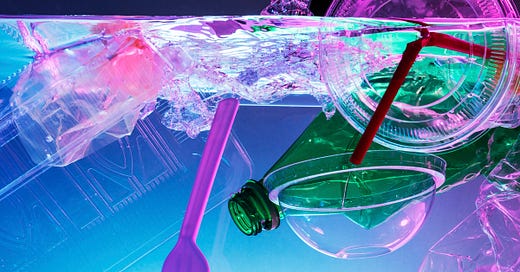WWF Calls for a Global Ban on ‘Harmful and Unnecessary’ Single-Use Plastic Items
The World Wildlife Fund (WWF), is calling on governments to support global bans and phase-outs of the ‘most high-risk and unnecessary’ single-use plastic products – such as plastic cutlery, e-cigarettes and microplastics in cosmetics, among others, ahead of the UN plastic pollution treaty talks taking place in Paris from 29 May – 2 June 2023.
A series of new reports – commissioned by WWF and conducted by Eunomia – has identified the most damaging plastic products polluting the environment and proposes global control measures needed to eliminate, reduce or safely manage and circulate these plastics.
WWF is advocating for these measures to be included in the treaty text, set to be published in the lead-up to the next round of talks in December 2023.
The research presents solutions for how to address the most urgent plastic pollution challenges under the new global treaty, by splitting plastic products into two groups – those that can feasibly be significantly reduced or eliminated in the short term (Class I) and those that cannot currently be feasibly eliminated or significantly reduced but require global control measures to promote recycling and responsible management and disposal (Class II).
The analysis splits the products into broad categories based on pollution risk, which WWF believes will aid effective regulation at the global level, over legislating for individual plastic items – which can be both complex and open up potential loopholes.
Recognising the complex, interconnected and pervasive relationship society has built with plastics, the analysis also considers any unintended environmental, health and societal consequences of eliminating or replacing a certain type of plastic.
“We’re locked into a system where we’re now producing quantities of plastic well beyond what any country can properly deal with, resulting in a plastic pollution crisis affecting the environment as well as society,” says Marco Lambertini, WWF Special Envoy.
“And if we don’t take action right now, the situation’s only going to get worse. On our current trajectory, by 2040 global plastic production will double, plastic leakage into our oceans will triple and the total volume of plastic pollution in our oceans will quadruple. We cannot allow this to happen. Plastic pollution is a global problem that requires a global solution. Negotiators must heed the guidance in this report and work together to create a treaty with comprehensive and specific binding global rules that can turn the tide on the plastic crisis.”
While plastic is cheap and versatile, with countless uses across many industries, almost half of all plastic is used to create short-lived or single-use products that can spend hundreds of years degrading – and most of which are consumed in high and upper-middle-income countries.
Research shows that by 2015, 60% of all plastics ever produced had already reached their end of life and been discarded. Globally, less than 10% of plastic products are recycled.
#recycle #sustainability #pollution #singleuseplastics





